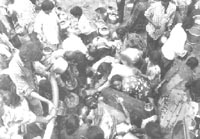The myth of drought
 even as this story goes to the press, Gujarat may be witnessing many more clashes over water. From as early as December 1999, when three farmers lost their lives in the riots over water in Jamnagar district, the dread of the dry summer months ahead was felt across the state. "Water availability should have been checked in winter and the municipal corporation should have started economising on water supply then. Nobody would have complained in winter and we would have been better off now,' conceded a senior municipal corporation official S Jagdishen, who has been given charge of water supply in Rajkot district.
even as this story goes to the press, Gujarat may be witnessing many more clashes over water. From as early as December 1999, when three farmers lost their lives in the riots over water in Jamnagar district, the dread of the dry summer months ahead was felt across the state. "Water availability should have been checked in winter and the municipal corporation should have started economising on water supply then. Nobody would have complained in winter and we would have been better off now,' conceded a senior municipal corporation official S Jagdishen, who has been given charge of water supply in Rajkot district.
But the state had missed out on those early opportunities to regulate and control water supply. So much so, that even the industries in the state were given a free hand to extract groundwater for their production purposes. For instance, before the water crisis had escalated to the present levels, the Tata Chemicals factory in Mithapur of Jamnagar district was extracting 14 million litre of water every day from the ground and two other lakes in the area.
Worse, the state government, seemingly unaware of the water related woes of the local people, allowed the Tata Chemicals cement plant to increase production from 1,000 tonnes to 2,500 tonnes per day. Amazed by the government's move, D S Ker, president of the Gram Vikar Trust, a non-government organisation ( ngo ) in Dwarka, was shocked: "How can the government allow expansion of such a water-intensive plant, which will deplete whatever groundwater resources are left in the region?'
This and several such desperate measures to cater to commercial and political interests seems to have taken a heavy toll on the state's groundwater resources. The government has already conceded that all major towns of Saurashtra, Kachchh and north Gujarat and more than one-third of the state's 18,000 villages are struggling for a daily supply of drinking water. Officialssay, that with more than 100 ofthe state's 140 dams having gone dry and the remaining containing water that will last for not more than a coupleof weeks, running trains carrying water tankers to these regions
